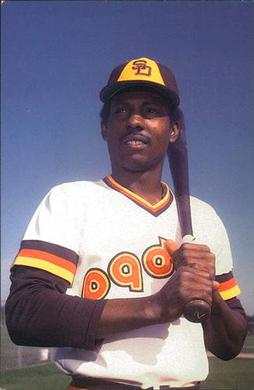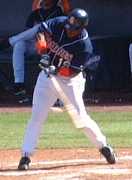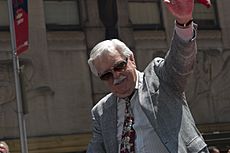Alan Wiggins facts for kids
Quick facts for kids Alan Wiggins |
|||
|---|---|---|---|

Wiggins with the San Diego Padres in 1983
|
|||
| Second baseman / Outfielder | |||
| Born: February 17, 1958 Los Angeles, California |
|||
| Died: January 6, 1991 (aged 32) Los Angeles, California |
|||
|
|||
| debut | |||
| September 4, 1981, for the San Diego Padres | |||
| Last appearance | |||
| August 28, 1987, for the Baltimore Orioles | |||
| MLB statistics | |||
| Batting average | .259 | ||
| Home runs | 5 | ||
| Runs batted in | 118 | ||
| Stolen bases | 242 | ||
| Teams | |||
|
|||
Alan Anthony Wiggins (born February 17, 1958 – died January 6, 1991) was an American professional baseball player. He played as a second baseman and outfielder in Major League Baseball (MLB). He played for the San Diego Padres and Baltimore Orioles from 1981 to 1987.
Wiggins was known for his amazing speed. He was a great leadoff hitter (the first batter in the lineup). His best season was in 1984 with the Padres. That year, he batted just before Tony Gwynn, another star player. Their strong hitting helped the Padres win the National League Championship Series (NLCS). They then went on to play in the World Series.
Wiggins grew up in California. He played college baseball before being drafted in 1977. In 1980, he set a professional baseball record. He stole 120 bases in one season while playing in the minor leagues. He joined the San Diego Padres in 1981. Within two years, he became a regular player. In 1983, he set the Padres' single-season stolen base record. He broke his own record the next year. His 70 stolen bases in 1984 is still a team record today.
After his baseball career, Alan Wiggins faced health challenges. He was the first MLB player known to have died from AIDS. Years later, two of his children, Candice and Alan Jr., became professional basketball players.
Contents
Early Life and Baseball Dreams
Alan Wiggins was born in Los Angeles, California. His mother, Karla Wiggins, raised him. As a child, he loved playing baseball. He was a big fan of the Los Angeles Dodgers. He especially admired their base-stealing shortstop, Maury Wills.
Wiggins went to John Muir High School in Pasadena, California. This was also the school of Dodgers legend Jackie Robinson. A baseball scout named Gib Bodet noticed Wiggins in high school. Wiggins was tall for an infielder at 6 feet 2 inches. He was an average hitter and fielder. But his incredible speed really stood out to Bodet.
The California Angels picked Wiggins in the 1977 MLB draft. He played junior college baseball at Pasadena City College. There, he was teammates with future major leaguers. An Angels coach told Wiggins that his speed would help him get a high batting average. He said, "If you can hit .200, you can run the other eighty points." Wiggins signed with the Angels in May 1977.
Alan Wiggins: Rising Baseball Star
Early Career and Stolen Base Record
Wiggins started his minor league career in 1977. He played for the Angels' rookie team in Idaho Falls. He hit .271 and stole 25 bases. In 1978, he stole 26 bases. But his batting average dropped. He left the Angels organization that year.
Wiggins then signed with the Los Angeles Dodgers before the 1979 season. He played for their Class A team, the Clinton Dodgers. He hit .257 and stole 43 bases. He also started playing shortstop and in the outfield. In 1980, playing for the Lodi Dodgers, Wiggins had an amazing season. He batted .288 and scored 108 runs. He also stole 120 bases in just 135 games! This set a new professional baseball record for stolen bases in a single season. It broke the minor league record of 116 and Lou Brock's major league record of 118.
After 1980, Wiggins was eligible for the Rule 5 draft. This draft allows teams to pick young players who are not on a team's main roster. The Dodgers did not protect Wiggins. The San Diego Padres then selected him in the draft.
Success with the San Diego Padres
Wiggins spent most of his minor league career as an infielder. But with the Padres' minor league team in 1981, he played mostly in the outfield. He hit .302 and stole 73 bases. He was called up to the major leagues in September 1981. He got five hits in 14 at bats.
Wiggins became a regular player for the Padres in 1983. He batted in the leadoff spot. He was an excellent left fielder. He hit .276 and stole 66 bases. This broke the Padres' single-season stolen base record. He was named the team's most valuable player that season.
In 1984, Wiggins moved to second base. He kept his leadoff spot in the lineup. He batted right before Tony Gwynn. In May, Wiggins stole five bases in one game. This tied a National League (NL) record. In August, he was hit by a pitch. This led to some tension and fights between the Padres and the Atlanta Braves.
For the 1984 season, Wiggins scored 106 runs. He stole 70 bases, which is still a Padres record. His speed helped Tony Gwynn a lot. Gwynn hit very well when Wiggins was on base. The two players were a big reason for San Diego's success. Wiggins would get on first base, steal second, and then score on a hit by Gwynn.
In the 1984 NLCS, Wiggins batted .316. He helped the Padres win the series. In the 1984 World Series against the Detroit Tigers, Wiggins batted .364. He had eight hits, the most of any Padres player. The Padres lost the World Series. But manager Dick Williams said Wiggins was "absolutely the most valuable player in the National League in 1984."
Time with the Baltimore Orioles
Before the 1985 season, Wiggins signed a big contract with the Padres. But he missed some time early in the season due to a knee injury. He was also suspended by the Padres. In June 1985, Wiggins was traded to the Baltimore Orioles.
Wiggins played 76 games for Baltimore that year. He hit .285 and stole 30 bases. He later said he was sad because he missed his family. His family moved to Baltimore before the 1986 season. But Wiggins still had some challenges. He was tagged out by the hidden ball trick in one game. He also made three errors the next day. He played only 71 games that season.
In 1987, Wiggins played as a designated hitter (DH) and shared second base duties. In early August, he had an argument with a teammate and manager. On September 1, MLB suspended Wiggins. He was released by the Orioles on September 29.
Later Years and Legacy

After leaving baseball, Alan Wiggins hoped to return. But he also started looking into real estate. In the late 1980s, Wiggins began to have serious health problems. His former teammate, Tony Gwynn, noticed Wiggins had lost a lot of weight in 1990.
In his final months, Wiggins moved to Pasadena. He was hospitalized in November 1990 with pneumonia and tuberculosis. He passed away on January 6, 1991, at the hospital. He was 32 years old.
Initially, his family said he died from lung cancer. But a few days later, a doctor shared that his health issues were complications of AIDS. Alan Wiggins was the first baseball player known to have died from AIDS.
After Wiggins died, many people remembered him. Former Orioles player Frank Robinson said Wiggins was "a very bright individual." Garry Templeton, a former Padres player, said he was a close friend. Wiggins is buried at Rose Hills Memorial Park in Whittier, California.
Personal Life
Alan Wiggins met his wife, Angela, in junior high school. They both graduated from John Muir High School. Wiggins wanted his children to grow up with both parents, unlike his own childhood.
Two of Wiggins' three children became professional basketball players. His daughter, Candice, was an All-American at Stanford University. She was drafted third overall in the 2008 WNBA draft. His son, Alan Jr., played college basketball and then professionally in other countries. His oldest daughter, Cassandra, played college basketball at New York University.
Wiggins was very close to his mother. In his later years, he also grew closer to his father, Albert. He often took his children to visit their grandfather. Wiggins was very sad when his father passed away in May 1990.
Wiggins was a very smart person. His agent, Tony Attanasio, said his intelligence sometimes caused problems with teammates. Wiggins was often quiet and found it hard to trust others. He enjoyed debating with teammates, especially Padres pitcher Eric Show. He liked to read books and newspapers. Some teammates did not understand his intellectual side. Tony Gwynn said that to truly understand Alan Wiggins, you had to know him well.
|
 | Roy Wilkins |
 | John Lewis |
 | Linda Carol Brown |


